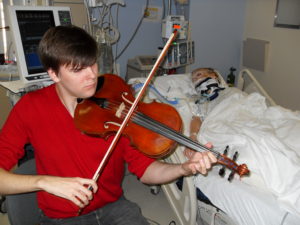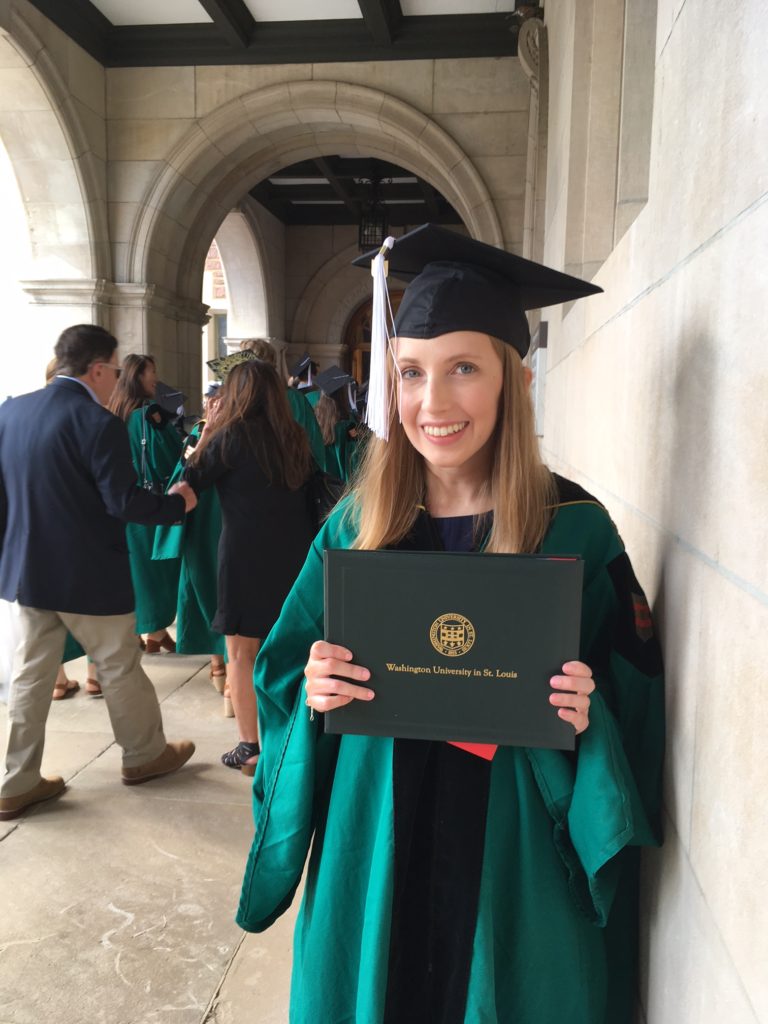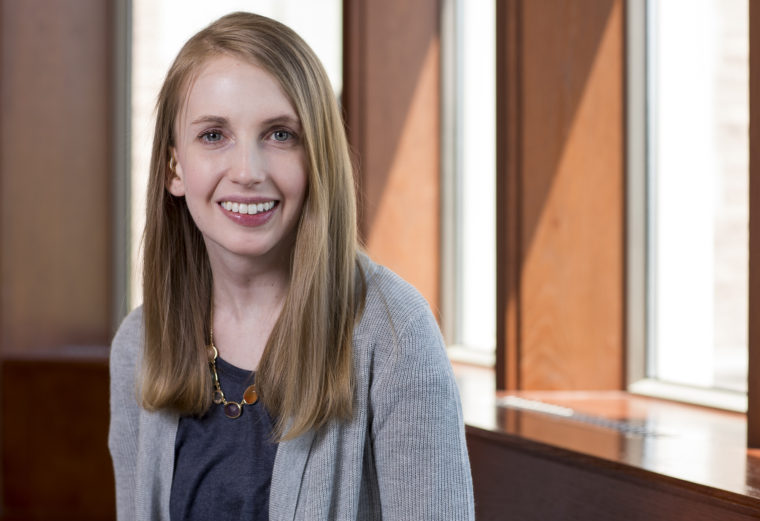Back when Laura Cobb was learning to walk again, she and her dad, Ron Cobb, would drive past Washington University on their way to therapy. Laura would raise her good arm and wave.
“It would break my heart,” he recalled. “She loved WashU so much. To be back, after everything, is just amazing.”
On May 19, 2017 — 12 years after she arrived as a freshman — Laura Cobb graduated with college honors from Washington University in St. Louis with a bachelor’s degree in psychological and brain sciences from Arts & Sciences. Now she works as a research technician in the lab of her adviser and mentor, Deanna Barch, chair of the Department of Psychological and Brain Sciences.
“Finally happy,” Laura Cobb said.
‘How anyone could survive’
On Sept. 16, 2008, a drunken driver slammed into Cobb’s car at Forest Park Parkway and Big Bend Boulevard. A senior at the time, she was returning to her Delmar Loop apartment after another late night at Olin Library. Police would not tell her mother, Lucinda Cobb, what happened — only that she needed to rush to Barnes-Jewish Hospital. As it would happen, Lucinda Cobb came upon the crash site on her way there.
“Her green Camry was completely mangled,” said Mrs. Cobb, who worked at the Brown School at the time. “I couldn’t imagine how anyone could survive such a crash.”
A Washington University police officer drove her the rest of the way to Barnes. (Her husband was out of town that night.) What happened next — the doctors, the machines, the forms — is a blur. But Mrs. Cobb does remember her daughter’s face.
“She looked pretty good,” Cobb said. “She had been cleaned up. There was no blood; there weren’t a lot of obvious wounds.”
But her internal injuries were severe. Doctors would learn later the young woman had suffered a traumatic brain injury and stroke. She stayed in a coma for three weeks.
“Why? Why?” Laura Cobb responded, when asked to recall her earliest reaction to the crash.
She also remembered her confusion upon seeing her shaved head — a confusion that gave way to panic when she could not form the words to ask why. The part of her brain that controls speech had been damaged. The disorder is called aphasia, and it impairs the brain’s ability to speak, write and process language.
But doctors could not explain that to Laura Cobb because her hearing had been damaged as well. The tiny bones in her ear had been pulverized in the crash.

“Can’t speak . . . Can’t hear,” she said.
Her parents were told to go home and rest, but they dared not leave her side. Lucinda Cobb took the day shift; Ron Cobb would try to sleep in a sleeping bag in the hallway near the intensive care unit or in a waiting room. Laura Cobb’s roommate and friends visited daily.
“They took up residence in the ICU,” her mother said. “They brought coloring books and wrote notes to Laura on the sheets of paper.”
“You still have them,” her dad added.
“My friends,” Cobb said and smiled.
‘Everyone came together’
After two months in the hospital, Laura Cobb moved home to Warson Woods, a St. Louis suburb. She gave rehab her all because that’s what she does. As a student, she made the dean’s list every semester, helped children with autism and performed with the Washington University Concert Choir and the Amateurs, an a cappella group.
Cobb amazed her therapists and doctors. She learned to walk again, regained some language and mastered assistive devices, such as an iPhone app loaded with oft-used words and phrases.
Cobb also became an advocate for aphasia awareness. In 2013, she created a funny video with tips on how to speak to people with aphasia. Satirizing some of the well-meaning but annoying behaviors she has encountered, she reminds viewers not to shout or talk down to her. When asked if she frequently is treated like a child, she shrugs with an expression that says, “It is what it is.”
Ron and Lucinda Cobb were proud of how far Cobb had come during her eight years of outpatient speech therapy, but they were concerned that they could be doing more. Their daughter spent a lot of time at home alone watching television, while Ron worked as an editor at the St. Louis Post-Dispatch and Lucinda worked as the PhD program manager at the Brown School.
“Everyone at the Brown School was so supportive, and I loved the students,” Mrs. Cobb said. “But it was difficult for me to be there. I was juggling work and trying to help her. As the months and then the years continued, I felt like I wasn’t doing my best at anything.”
When the Affordable Care Act passed, she decided to retire.
“We realized that we could make this work,” recalled Cobb, who had worked at the Brown School for 21 years. “We could do other, more intensive types of therapeutic activities and who knows, maybe she could go back to school.”
Did Laura Cobb want to go back?
“Oh yes,” she said. “Every day.”
The family reached out to her advisers, Barch and Sean McWilliams, assistant dean in Arts & Sciences. Yes, they said, the university was committed to providing Cobb with the services and accommodations she needed to complete her degree. They connected the family to Libby Lessentine, disability resource coordinator at Cornerstone: The Learning Center.
Some 900 students on the Danforth Campus receive services for a variety of learning, psychological and physical disabilities. But this was the first time Lessentine had worked with a student with an aphasia diagnosis.
“It always starts with the student,” Lessentine said. “With Laura, we discussed what her concerns were, what her strengths are now. From there, we started thinking about accommodations that would level the playing field for her and allow her to show what she knows. It’s a process — it was an ongoing conversation that we adjusted from class to class.”
Cornerstone secured a notetaker for a psychology class; other faculty members came up with innovative ways to assess her work. Because she already had completed most of her psychology coursework, Cobb selected electives that supported her recovery.
One class, taught by Kathy Kniepmann, associate professor of occupational therapy, explored the media’s portrayal of the disabled. Another, taught by Christine Armistead, director of vocal activities in the music department in Arts & Sciences, improved her verbal fluency through singing, much like a recognized form of speech therapy known as melodic intonation.
“Everyone came together to make it happen — the faculty, the staff, the team at Cornerstone,” Mrs. Cobb said. “We never had to ask. They just supported her every step of the way.”

At Commencement, Chancellor Mark S. Wrighton recognized the real champions: the Cobb family.
“Some of our new graduates have faced major hurdles,” Wrighton told the crowd. “Take, for example, the great achievement of Laura Cobb. Her undergraduate experience was interrupted by a devastating accident, but she battled back. She overcame many obstacles with the help of her parents and friends. Congratulations Laura Cobb.”
Mr. Cobb recorded the chancellor’s remarks and replayed them numerous times.
“Each time I got a little choked up,” he said.
‘The same Laura’
Still, Cobb acknowledged that she sometimes felt out of place on campus. Her fellow undergrads were so much younger, and most of her old friends have moved away and moved on. The place where she felt most at home was Barch’s lab, where the researchers were her age and, as neuroscientists, they understood aphasia.
She rejoiced when Barch asked her to apply for a job as a research technician. Today, she supports multiple projects, including one where she must “thin slice,” i.e. find patterns, in videotapes of parent-child interaction.
Barch, who went to the hospital the day of the crash, called Cobb’s recovery “remarkable.”
“Is she the same from before the accident? No,” Barch said. “But it’s very clear to me it’s the same Laura — curious, intelligent, hard-working. The positive, can-do attitude of both her and her parents is really, truly amazing.”
Being honest
Lucinda Cobb admitted she doesn’t always feel amazing and conceded that she feels mixed emotions about this next stage of her daughter’s life. Mother and daughter were already very close before the accident, a bond that has strengthened during these long, hard years of recovery. The two are rarely apart, and Laura will glance at her mom when she is searching for a word.
“It’s complex,” Lucinda Cobb said. “I’m always worried about fostering independence while supporting her. I often wonder if I’m too involved. But I don’t want to throw her into the pool. I know there have been times that I’ve gotten it wrong.”
Asked if her mother is right, Laura Cobb does not respond at first.
“Be honest,” Mrs. Cobb urged. “Be honest.”
She then asked her daughter if she was controlling or demanding.
“No,” came the reply. “No.”
After a few more seconds pass, Laura Cobb found the right words: “Funny. Caring. Fierce.”
